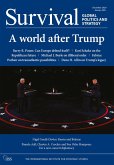Overseas military bases have been the bedrock of the United States' ability to project military power, exert political influence and deter potential adversaries since the Second World War. But fatigue with America's 'forever wars', as well as more nuanced financial and strategic reasons, has inclined the public and policy community to favour reducing US global military activities and overseas presence.
In this Adelphi book, Jonathan Stevenson argues that this desire does not necessarily translate into sound strategy. Overseas bases are a key element of the reassurance required to resurrect and bolster America's reputation among its allies and adversaries. Meanwhile, strategic imperatives and geopolitical realities impose restraints in every theatre. The fluidity prevailing in the Middle East and Indo-Pacific counsels maintaining forward-deployed forces there at roughly the current level. Russia's confrontational posture towards NATO and invasion of Ukraine, as well as NATO's short- and medium-term reliance on US capabilities, require the American presence in Europe to increase and expand eastward. The US should not commit itself to a foreign policy that is heavy on forward-deployed military power and light on diplomacy. But paradoxically, reducing forward military presence may not be consistent with a policy that is less focused on military power as a means of achieving stability and security.
In this Adelphi book, Jonathan Stevenson argues that this desire does not necessarily translate into sound strategy. Overseas bases are a key element of the reassurance required to resurrect and bolster America's reputation among its allies and adversaries. Meanwhile, strategic imperatives and geopolitical realities impose restraints in every theatre. The fluidity prevailing in the Middle East and Indo-Pacific counsels maintaining forward-deployed forces there at roughly the current level. Russia's confrontational posture towards NATO and invasion of Ukraine, as well as NATO's short- and medium-term reliance on US capabilities, require the American presence in Europe to increase and expand eastward. The US should not commit itself to a foreign policy that is heavy on forward-deployed military power and light on diplomacy. But paradoxically, reducing forward military presence may not be consistent with a policy that is less focused on military power as a means of achieving stability and security.
Dieser Download kann aus rechtlichen Gründen nur mit Rechnungsadresse in A, B, BG, CY, CZ, D, DK, EW, E, FIN, F, GR, HR, H, IRL, I, LT, L, LR, M, NL, PL, P, R, S, SLO, SK ausgeliefert werden.









